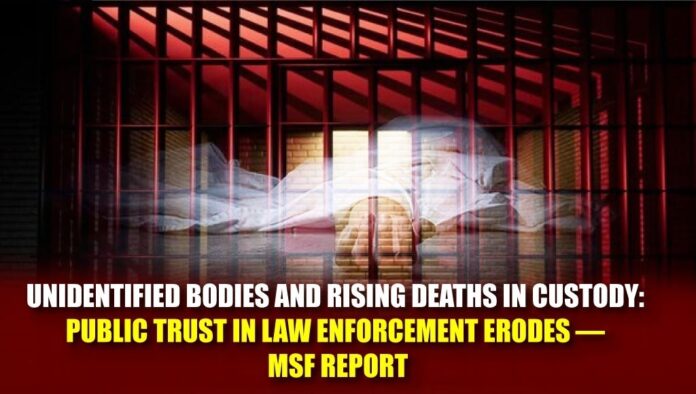
The nation trembles under a chilling revelation:
Unidentified corpses and deaths in state custody have sharply increased this October compared to the previous month, according to the Manobadhikar Sangskriti Foundation (MSF) — a human rights organization whose latest monthly report paints a grim picture of Bangladesh’s deteriorating human rights landscape.
The findings, released Friday, highlight a disturbing rise in deaths that has cast a shadow of fear and suspicion over public life. MSF warns that the trend underscores the growing sense of insecurity among citizens — and raises serious questions about the role and accountability of law enforcement agencies.
A Surge in Unidentified Corpses
The MSF report reveals that 66 unidentified bodies were recovered across the country in October — a sharp rise from 52 in September.
These are not isolated tragedies; they are symptoms of a deepening crisis of safety and justice.
The bodies were found floating in rivers and ponds, lying beside highways and railway tracks, under bridges, in farmlands, and in abandoned lots. Some were discovered with slit throats, bound in sacks, or bearing signs of brutal assault — silent witnesses to crimes gone unanswered.
MSF warns that the growing number of such recoveries reflects a frightening erosion of public security, and the authorities’ failure to identify the victims exposes alarming weaknesses — or indifference — within the law enforcement system itself.
The organization’s data reveals that among the bodies recovered were one child, one teenager, eleven women, and fifty-three men.
The youngest victim was a seven-year-old child, another a fifteen-year-old boy. Fifteen men and two women were aged between 20 and 30, while nineteen men and six women were between 31 and 40. The list continues with victims in their 40s and 50s — and three bodies so disfigured that even their age could not be determined.
MSF insists: “Recovering an unidentified body is not enough. The state bears a duty to uncover the victim’s identity, determine the cause of death through proper forensic investigation, and bring the perpetrators to justice.”
Deaths in Custody Continue to Rise
The report also exposes another grim pattern: 13 prisoners died in custody in October, compared to 8 in September.
Of these, six were convicted inmates and seven were under trial.
The deaths occurred across multiple facilities — four convicts and two remand prisoners in Dhaka Central Jail (Keraniganj), one inmate in Kashimpur Central Jail (Gazipur), one in Sherpur Jail, and additional deaths reported in Khulna, Tangail, Chattogram, Sirajganj, and Manikganj jails.
All prisoners reportedly died outside prison walls — in hospitals.
MSF’s Executive Director, Saidur Rahman, told Prothom Alo:
“The rise in unidentified bodies and deaths in custody reflects an alarming decline in the country’s human rights situation. Law enforcement agencies seem content with merely recovering the bodies — but they are failing in their duty to identify them, conduct proper investigations, and return the remains to the families.”
He added:
“The increase in both anonymous corpses and custodial deaths has eroded public confidence in law enforcement. People are beginning to question whether these agencies serve justice — or conceal it.”
Mob Killings and Political Violence Escalate
The MSF report further documents 49 incidents of political violence in October alone, affecting 549 people — 2 killed and 547 injured.
Among the dead were supporters of the BNP. In September, the number of violent political incidents stood at 38.
At least 11 of these October incidents involved attacks, arson, or explosions targeting party offices, homes, and businesses — grim signs of a political landscape cracking under pressure.
Meanwhile, mob justice remains rampant.
There were 44 incidents of mob beatings in October, compared to 43 in September. Twelve people were killed this month — fewer than the 24 killed last month — but the persistence of such vigilante killings exposes a haunting truth:
When faith in justice fades, chaos becomes law.
A Nation on Edge
From the rivers carrying nameless bodies to the cells where prisoners die unseen, the October report from MSF lays bare a country slipping into fear and uncertainty.
The line between security and suppression grows ever thinner — and the public’s trust in those sworn to protect them continues to erode.
Until transparency, accountability, and justice are restored, these numbers are not statistics — they are the echoes of a nation’s silent cry.



